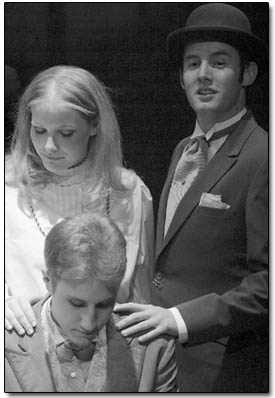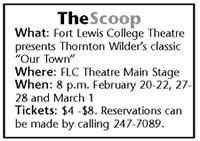|
FLC takes on Wilder classic
written by Missy Votel
 |
| Mrs. Gibb (Kristen Hathcock),
Dr. Gibb (Josh Martin) and George Gibb (Stephen Juhl)
in a scene from FLC’s production of “Our
Town.”/Photo by Todd Newcomer. |
Many may remember Thornton Wilder’s
classic play, “Our Town,” from their school
days. For several decades after its debut in 1938 –
the same year it won a Pulitzer – it was a mainstay
of community and high school stages across the country.
However, in recent years, possibly with the advent of
more high-tech, elaborate stage offerings, the rudimentary,
turn-of-the-20th-century play fell out of favor.
But as Americans begin a new century, rife with complexities
of global proportions, many find a longing to return to
simpler times and places, such as Thornton’s fictional
quintessential New England town, Grover’s Corners,
N.H., population 2,640. The play is currently enjoying
a resurgence on stages across the country, from Broadway,
where it stars Jane Curtain and Paul Newman, to the Fort
Lewis College stage, where the play will run for the next
two weekends.
According to director of the FLC production, Michael
Lawler, a Phoenix resident who did a stint as visiting
theater instructor at FLC in 1999-2000, the decision to
do “Our Town” was an easy one.
 “I
had never read or seen it before, and I read it and fell
in love,” said Lawler, who also directed “Fortinbras”
at FLC. “As soon as I read it I knew it was the
right choice.” “I
had never read or seen it before, and I read it and fell
in love,” said Lawler, who also directed “Fortinbras”
at FLC. “As soon as I read it I knew it was the
right choice.”
He said the play is particularly relevant today, in the
wake of recent world events, including Sept. 11.
“It’s a play that celebrates the interdependency
of a community and a moral value system that is no longer
in place,” he said. “Twenty years ago people
would have looked at this play and said, ‘Oh, come
on.’ But the play celebrates community love and
hope, and we yearn today for that kind of love.”
Although the play is set in New England, in an era predating
cars or television, Lawler said it is a timeless piece
that transcends such barriers. While the play is called
“Our Town,” it may as well be “Any Town.”
“It’s the story of an all-American small
town,” Lawler said.
At its most basic, “Our Town,” is a story
of boy meets girl, centering on the lives of childhood
sweethearts George Gibb and Emily Webb and their respective
families. However, as the play progresses, it delves much
deeper.
“It’s a play that celebrates life and day-to-day
events that we are so busy that we can’t acknowledge,”
said Lawler.
Wilder drives this point home with the utter simplicity
of the set. There are no props in the play – save
for two dinette sets, each denoting the kitchens of the
respective families; a few rows of church pews; and two
step ladders. All actions in the play are pantomimed,
something Lawler had to teach to his cast of full-time
students.
“The whole cast had an exercise in pantomime and
techniques,” said Lawler, who took his cues from
a movement teacher at Arizona State University. “We
worked on that the first week.”
While one may think a play without props would be distracting,
Lawler points out is has the opposite effect.
“It allows the play to move more fluidly and focuses
attention on relationships in the play,” he said.
Indeed, Lawler is right. From the first scene, when the
Stage Manager, played by Eagle Young, who acts as play
narrator and commentator, gives a sweeping overview of
the town, imagination takes over. As the action shifts
to the morning routine of the Webb and Gibb families,
no props are needed to decipher that the respective matrons
are stirring batter, flipping pancakes and pouring hot
coffee.
The play, which spans three acts and 12 years, opens
around the kitchens of the families. It is here that the
audience is introduced to the main players, a wide-eyed
Emily, played by Kelly McDonald, and a lanky, young George,
played by Stephen Juhl. The main cast is rounded out by
the children’s families: Tara Sheehan and Herschel
Warner, who play Emily’s parents, Mr. And Mrs. Webb;
and Kristen Hathcock and Josh Martin, who play Dr. and
Mrs. Gibb, the parents of George. Emily and George also
have siblings: Wally Webb, played by Andrew Hall, who
makes a limited appearance, and George’s younger
sister, Rebecca, played by Anna Pierotti, who also has
a smaller role.
As the opening day wears on, we are given a glimpse into
the everyday life of the characters and the town: the
milkman and paperboy make their morning deliveries; Mrs.
Gibb strings beans from her garden; Dr. Webb returns from
attending a birth; and George and Emily discuss homework.
The young players do a notable job of performing their
daily routines with just the right amount of self-awareness,
neither underplayed nor over the top. Juhl, in his knickers
with a baseball typically clenched in fist, fits the part
of a gangly teen on the verge of manhood. McDonald, with
a smart red bob and soft voice, comes across as a confident
yet sweet Emily, a bright girl with a slightly dreamy
side.
Perhaps most commendable are the performances of the
young actors entrusted to play the parents. Hathcock capably
takes on a matronly, doting persona of someone twice her
age as she admonishes her overworked husband to get some
rest, and Sheehan brings a lightness and humor to her
role as the nurturer of the Webb clan.
“I would rather have my kids healthy than bright,”
she says while scolding them to eat their breakfast slowly
before rushing off to school.
Likewise, Martin is convincing as the likable but earnest
town doc, and Warner, with his jolly disposition and white
socks, does a good job as the bumbling and oblivious but
good-hearted editor of the town paper.
Perhaps the most daunting role in the play is that of
the Stage Manager, who must deliver several long asides
and commentaries, all while appearing personable and relaxed.
Young does an impressive and unflinching job of looking
straight into the eyes of his audience as he delivers
his lines in a genuine, welcoming manner. However, it
may be possible that he knows his lines a little too well.
A few times he tended to speed up his delivery, which
made it difficult to understand all that he was saying.
Nevertheless, he does a fine job of guiding the audience
through the various acts of the play, growing increasingly
philosophical as the play wears on.
“The play gets serious from here on,” he
tells the audience at the start of the second half of
the play, which chronicles the marriage of George and
Emily, as well as Emily’s untimely death.
Indeed, as we enter the third and final act, nine years
after the wedding, the play takes on a somber note. We
find things have changed since we last visited Grover’s
Corners. Not only have we lost a few key characters along
the way, but Fords have replaced horses; people have begun
locking their doors out of fear; and the town has become
generally “citified” in the words of Dr. Gibb.
“I remember when dogs used to sleep in the streets
all day long,” bemoans the Stage Manager.
However, he later points out that such changes are only
superficial.
“On the whole, things don’t change that much
around here,” he said. “There’s something
that’s eternal about all of us.”
We learn just how eternal as we venture with Emily, who
died in childbirth, from the afterlife to revisit her
12th birthday in an effort to savor one last, ordinary
scene from her life. To her credit, McDonald, in wedding
dress, is neither hysterical nor preachy as she tries,
unsuccessfully, to engage her family in breaking from
their daily routines to enjoy the simplicity of life’s
pleasures at hand.
“Do any human beings realize life while they live
it?” an older, wiser and frustrated McDonald asks
her fellow residents in the afterlife.
Sadly – except in the case of saints and poets
– the answer is no, we are told by a pensive Stage
Manager as the sole spotlight over our heroine fades to
black.
It is a simple ending to a simple play – allowing
us to give pause to ponder and appreciate the simple thing
we call life.
|

